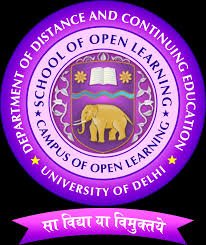College Description
The Department of Distance and Continuing Education (DDCE), established by the University of Delhi, aims to provide flexible and accessible learning opportunities to a wide range of learners, especially working professionals, adult learners, and those unable to pursue full-time education. The department offers various undergraduate, postgraduate, and diploma programs through distance education and continuing education modes. These programs cater to diverse disciplines, including Arts, Commerce, Management, Social Sciences, and more. The department focuses on providing quality education through study materials, online resources, and regular counseling sessions. It also organizes workshops, seminars, and practical training to enhance the learning experience. With an emphasis on lifelong learning, the DDCE encourages the development of skills and knowledge that support career advancement, personal growth, and professional development. Admissions to the programs are based on the university’s criteria and the specific requirements of each course.
Courses & Fees
Admission
About the Department
The Department of Distance and Continuing Education (earlier called the Department of Adult, Continuing Education & Extension) is focused on non-formal education, lifelong learning, and skill enhancement. It supports a wide range of certificate, diploma, and short-term courses, often catering to working professionals, adult learners, and students who want to enhance their skillsets alongside regular studies.
Admission Overview
Admissions to the programs offered by this department do not follow the centralized UG/PG admission process of regular Delhi University colleges. Instead, the department runs its own admission cycles depending on the nature of the course.
Types of Programs Offered
-
Certificate Courses (e.g., Journalism, Human Rights, Counseling, Office Management)
-
Diploma Courses (in select fields, typically skill- or employment-oriented)
-
Workshops and Training Programs (in collaboration with NGOs, government bodies, etc.)
Eligibility Criteria
-
Varies by course:
-
For certificate courses: Class 12 pass is usually sufficient.
-
For diploma or specialized programs: Graduation may be required.
-
Age limit is usually flexible to encourage adult learners.
-
Admission Process
-
Notification/Advertisement: The department releases an official admission notice on its website and notice boards.
-
Application Form: Interested candidates need to fill out the application form (usually available online or offline).
-
Documents Submission: Submit copies of educational qualifications, ID proof, and photographs.
-
Shortlisting: Some courses may have a first-come-first-serve basis, others may shortlist based on qualifications or interest.
-
Admission Confirmation: After verification, pay the course fee to confirm your admission.
Documents Typically Required
-
Educational certificates (10th, 12th, or graduation depending on the course)
-
Passport-size photographs
-
Identity proof (Aadhaar, PAN, etc.)
-
Category certificate (if applicable)
-
Course application form with fee receipt
Course Duration and Fees
-
Certificate Courses: 3–6 months
-
Diploma Courses: 6 months to 1 year
-
Fees: Usually very affordable, ranging from ₹2,000 to ₹15,000 depending on the program
Key Features
-
Classes may be held on weekends or evenings, convenient for working individuals
-
Focus on skill-based learning and employability
-
Some courses may offer internship opportunities or project work
-
Department may issue a certificate upon successful completion
Placement
Nature of the Department
This department primarily offers non-formal education through short-term certificate and diploma courses. It is designed to promote skill development, continuing education, and community engagement, especially for:
-
Working professionals
-
Adult learners
-
Students from economically or socially marginalized groups
-
Those looking for career change or upskilling
Placement Support Overview
Unlike traditional colleges under DU that run 3-year undergraduate degree programs, this department:
-
Does not have a formal placement cell like regular colleges
-
Does not offer full-time job placements after course completion
-
Focuses more on employability skills and making learners job-ready
However, the department supports students in the following ways:
Career and Employability Support
-
Offers career counseling sessions, including resume writing and interview skills
-
Collaborates with NGOs, government bodies, and community-based organizations for internship or volunteer work opportunities
-
Some certificate courses (e.g., in Journalism, Human Rights, Counseling, Office Management) may include practical training or fieldwork, which helps in job applications
-
Encourages learners to use the skills gained to find freelance, part-time, or entry-level work
Types of Opportunities Students Pursue After Courses
-
Internships with NGOs, media houses, or social organizations
-
Freelance or part-time work (e.g., office assistance, journalism, community service roles)
-
Entry-level roles in HR, customer service, data entry, counseling support, or training roles
-
Some students use the certifications to enhance their resume while pursuing regular studies or other degrees
-
Others may use these programs to qualify for NGO or government outreach roles






 OMAWATI686b96fcc7a5c.jpg)